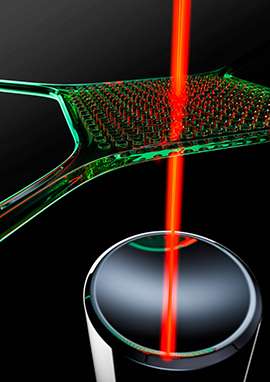Best of Last Week – Quantum physics in real life, testing relativity in space and a high-fat diet starving the brain

(ScienceX)—It was another good week for physics as a team at Delft University took the next step towards observing quantum physics in real life—they created a reflective membrane, visible to the naked eye, which was able to vibrate with very little energy loss at room temperature. A team with the French National Centre for Space Studies announced that Einstein's theory of relativity will face a satellite test soon with the measurement of two different pieces of metal in orbit—Einstein's theory says that they should behave the same under perfect free-fall. Also, pop went the weasel, as the Hadron Collider shut down—researchers working at CERN faced technical issues as a weasel relative called a beech marten got into the works and caused a short circuit. The team reported that it was "not the best week for LHC."
It was also a big week for space news as a team with Southern Methodist University reported on their observations of a nearby massive star explosion 30 million years ago that equaled the detonation of 100 million suns—they estimated that prior to exploding, the star had a radius 200 times that of our sun. Also, a team with the University of Cambridge spottedwinds moving at a quarter the speed of light leaving mysterious binary systems—two black holes were consuming their companion stars, kicking matter out into the surrounding area. And researchers Adam Frank and Woodruff Sullivan with the University of Rochester and the University of Washington respectively asked, Are we alone? They have been trying to set some limits to our uniqueness by taking into account the discovery of new exoplanets.
In other news, a team a team working in Spain announced that they had used skin cells to create human sperm as part of a study designed to help couples who are unable to have children, while another team at Lund University reported on the results of their experiments showing that despite their small brains, ravens are just as clever as chimps. Also, a team working at Indiana University reported on the results of experiments that showed that infant attention span suffers when parents' eyes wander during playtime, such as when they are distracted by a smartphone.
And finally, if you have suspected that eating food high in fat might be messing with your brain, you might be interested in the results of a study conducted by a team at the Max Planck Institute. They found that a high-fat diet starves the brain, claiming that such a diet results in less glucose reaching the brain.
© 2016 ScienceX